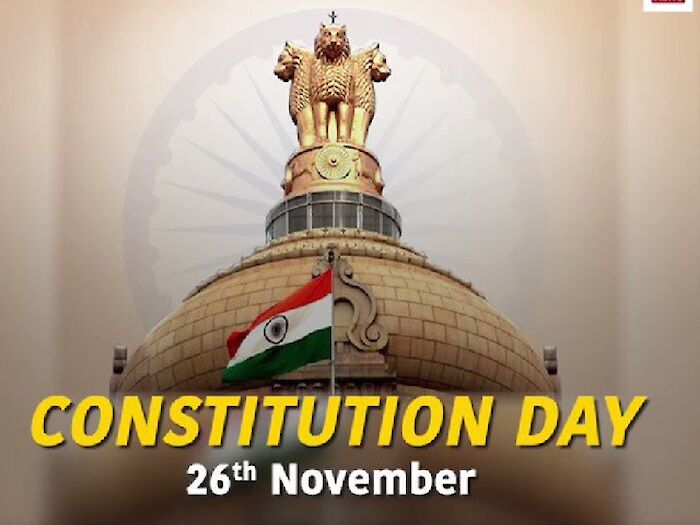“Constitution is not a mere lawyer’s document, it is a vehicle of life & its spirit is always the spirit of age” – Dr. B.R. Ambedkar
The Constitution of India is the supreme law of India. The document lays down the framework demarcating fundamental political code, structure, procedures, powers, and duties of government institutions and sets out fundamental rights, directive principles, and the duties of citizens. It is the longest written constitution of any country on earth.
Our constitution was framed with right intent with accommodative ideas from diverse backgrounds and has very much proved to be a living document. It is flexible and amendments have occurred from time to time to adjust any dynamic change. Yet it is beauty of our constitution that it provides for a platform where our representatives can make changes in it if required. Constitution day is celebrated every year on 26 November to commemorate the adoption of constitution of India.
Indian constitution recognises the following six fundamental rights which hold very important role in every one of our lives:
- Right to equality (Articles. 14-18): The right to equality includes equality before the law, the prohibition of discrimination on grounds of religion, race, caste, gender or place of birth, equality of opportunity in matters of employment, the abolition of untouchability and abolition of titles.
- Right to Freedom (Articles. 19-22): The right to freedom includes freedom of speech and expression, assembly, association or union or cooperatives, movement, residence, and right to practice any profession or occupation.
- Right Against exploitation (Articles. 23-24): The right against exploitation prohibits all forms of forced labour, child labour and trafficking of human beings.
- Right to Freedom of Religion (Articles. 25-28): The right to freedom of religion includes freedom of conscience and free profession, practice, and propagation of religion, freedom to manage religious affairs, freedom from certain taxes and freedom from religious instructions in certain educational institutes.
- Cultural and Educational Rights (Articles. 29-30): The Cultural and educational Rights preserve the right of any section of citizens to conserve their culture, language or script, and right of minorities to establish and administer educational institutions of their choice.
- Right to Constitutional Remedies (Articles. 32-35): The right to constitutional remedies is present for enforcement of fundamental rights.
Apart from these
The right to privacy is an intrinsic part of Article 21 (the Right to Freedom) that protects the life and liberty of the citizens & Right to information (RTI) has been given the status of a fundamental right under Article 19(1) of the Constitution in 2005 under which every citizen has freedom of speech and expression and the right to know how the government works, what roles it plays, what are its functions, and so on.
The Right of Children to Free and Compulsory Education Act at elementary level has been made one of the fundamental rights in 2002 under the 86th Amendment of 2002. However this right was brought in to implementation after eight years in 2010. On 2 April 2010, India joined a group of few countries in the world, with a historic law-making education a fundamental right of every child coming into force.
As per the act, it will be binding on the part of the local and state governments to ensure that all children in the 6–14 age group get schooling. Even private educational institutions should reserve 25 percent seats for children from the weaker sections of society.
The above mentioned facts make us realise the role of our Indian constitution in everyday life. This can be further realised with few examples.
An example that constitution from the day it came into existence has always protected the citizens is the story of Mr. Mohammed Yasin. In December 1950 Mr. Yasin, a young vegetable vendor in the small town of Jalalabad in north India received notification that the town government was implementing a new set of by-laws licensing the sale of various commodities and only one licence for the sale of vegetables in the town area. The licence has been issued to a merchant, granting a virtual monopoly over the vegetable trade in Jalalabad. Yasin petitioned supreme court against this notification based on the fact that the notification violated his right to a trade and an occupation conferred by the constitution of India. He is one of the first Indians to present himself before the new Indian supreme court as rights bearing citizen. History will give innumerable circumstances where citizens and their rights were protected by our Indian constitution. Till today, people are protected by the rights conferred by constitution to an individual to protest against various government policies as in case of all those who have gathered in Shaheen Bagh in protest against CAA and NRC.
As the constitution has provided fundamental rights to people to live in a way which they want, it has also given us fundamental duties. These fundamental duties are guidelines to realize the dreams of a peaceful and prosperous country. In the same way, the Governments are also provided with set of instructions known as Directive Principles which must guide their way to make society more inclusive having equal opportunity for all citizenry. It is totally upon the people of India, our representatives, our office-bearers, etc who are holding important posts how they take forward the legacy of our founding fathers.
As Dr. B.R. Ambedkar quotes,
“However good a constitution may be, if those who are im0plementing it are not goo, it will prove to be bad. However bad a constitution may be, if those implementing it are good, it will prove to be good”.
We must remember that the constitution will never fail us but we the people of India will either fail it or keep it great!
[ A total of 13 Likes and 8 Loves for this article. Please caste your vote.!! ]
Comment What You Think






